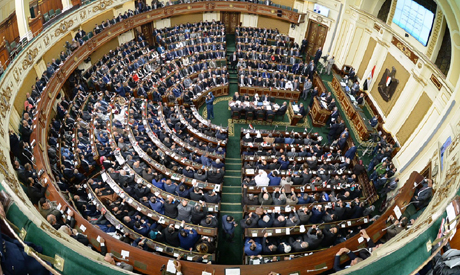
Egyptian parliament (Reuters)
A government committee will soon meet to amend Egypt's controversial protest law to go in line with the constitution, Minister of Parliamentary Affairs Magdi El-Agati announced on Wednesday.
El-Agati disclosed that under instructions from Prime Minister Sherif Ismail, he was entrusted with forming a committee that will take charge of amending the protest law.
"There have been many complaints about this law, especially in the area of penalties, and we will see if these should be amended to go in line with the constitution," said El-Agati.
Critics have long charged that the law – which mandates stiff prison terms for those who protest without a government permit – infringes on the constitutional right of citizens to hold peaceful protests, including street demonstrations.
Article 73 of the constitution states that "citizens shall have the right to organize public meetings, marches, demonstrations and all forms of peaceful protests, without carrying arms of any kind, by serving a notification as regulated by Law."
El-Agati told reporters that the objective of the expected amendments is to strike a balance between "national security and public order" on one side and the right to exercise peaceful protests on the other.
"We want to reinforce rights and freedoms as stipulated by the new constitution, but we also want to make sure that these freedoms do not disrupt the state's internal order," he added.
El-Agati also explained that "there is a thin line between peaceful and violent protests and the constitution is clear about this."
Controversial law
The 25-article protest law was issued in November 2013, four months after Islamist president Mohamed Morsi was ousted from office.
Dozens of demonstrations, which often saw deadly clashes with police, were held by Morsi's supporters after his ouster, leading then-interim president Adly Mansour to pass the protest law.
The controversial law was described by critics as "restrictive", with scores of Islamist and liberal political activists going behind bards after falling victim of the law.
The law was not among the 340 legislations revised by the new parliament after it first convened last January, as the parliament was tasked with revising laws passed in its absence between January 2014 – when the new constitution was ratified – and January 2016.
El-Agati said the committee in charge of amending the law will include government legal advisors.
"They will study the articles imposing penalties on violators of the law in order to make it more possible to organise peaceful protests," said El-Agati.
"The committee can also seek the advice of independent legal experts and human rights organisations, and it will review protest laws issued in different countries to [determine if Egypt's law] is significantly tougher."
El-Agati's announcement came as a surprise to many, as it was a mere three weeks ago when he told reporters that "Egypt's protest law is one of the best laws in the world and the government has no intention of modifying its articles, because they regulate protests in a good way that prevents chaos and disorder on the streets."
His statement comes a few days after President Abdel-Fattah El-Sisi said in a TV interview that he intends to issue a pardon for the "few" young political activists jailed under the protest law.
Two courts in Cairo and Giza recently reduced prison terms for several political activists who participated in protests last April against the recent Egyptian-Saudi deal redrawing maritime borders.
The deal, which puts two Red Sea islands under Saudi control, provoked a number of large protests in Cairo shortly after it was announced.
Short link: